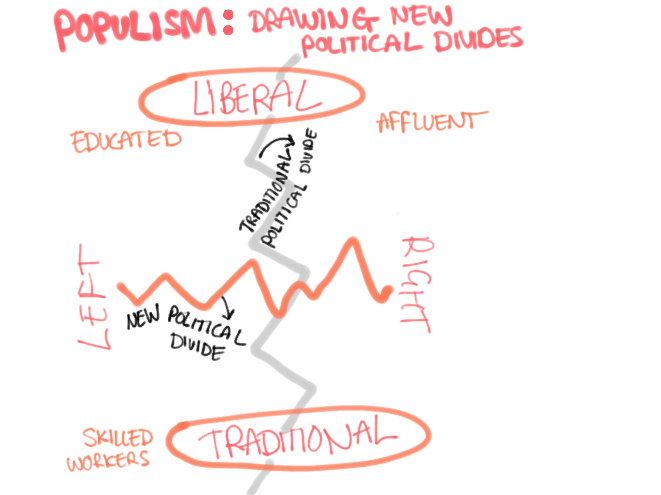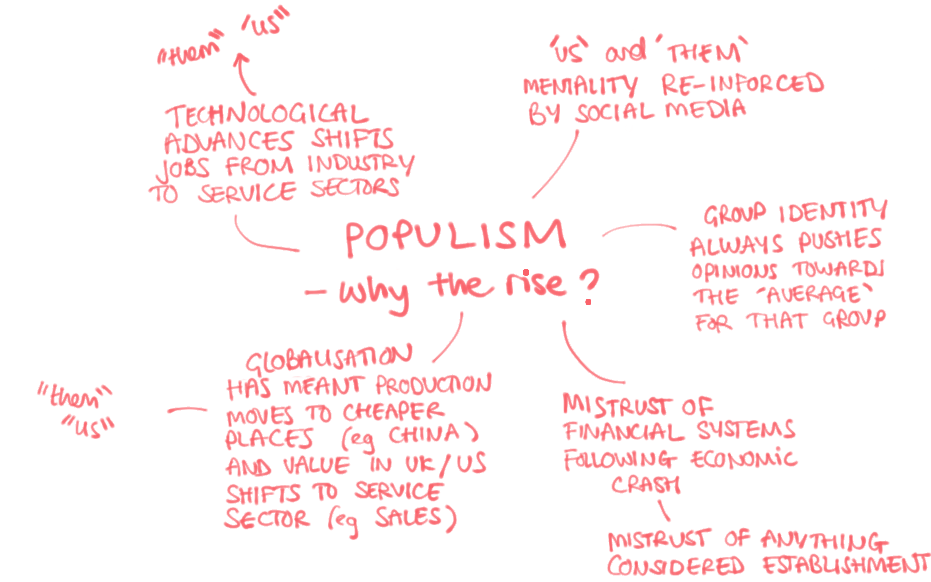Populism has made us recognise a shift from a left-wing right-wing political font-line to a line that separates between cultural attitudes and education. This post looks at how or why this might have have come about when what this means; it is a fad or here to stay?
How populism is becoming the new ‘Us’ vs ‘Them’
Politics often plays out as a ‘one-against-the-other’ race. In some countries there are literally two political parties, but even if there are more, there is usually still a ‘them’ and ‘us’ divide in talking most big topics. In the 1900s there was the leading, elite upper-class and then the workers parties. Socialists were the workers revolting against the elite in rule and representing the people. We have always talked about this as the left/right divide. The left for a big state and shared resources and the right for a small state and individual freedoms. Now though, the big drawing line separating populist groups from any others is a cultural attitude and educational background.
How is populism re-shaping political boundaries?
Rather than rich and poor, populism has drawn a new line has been drawn between educated urban elite and provincial, socially conservative voters. It’s not a difference in class that leads to voting on different economic grounds. It’s a difference in culture voting on different values.
They often vote against the economic systems that would benefit them. This happened in rural America where voters are from very low-income backgrounds voted for Trump. Trump was a populist leader who’s policies firmly oppose state support for lower incomes.
The same happens in the UK, large working-class towns in the north switched from voting labour (the party of the working class) to UKIP or conservatives under a populist leadership because the values were more important to them than the economic package that might come from an economically left-leaning party.

Why are these things happening now?
What is it about these times that have seen this huge increase in populism recently? There are 3 main factors that I’ll discuss below.
1. Group identity and populism
It’s always the way that when there are two camps, belonging to one and constant reinforcement of your camps ideas and values with align your views more closely with the camp you follow. This is amplified by social media. Polarisation on civil rights and immigration and globalisation has been heightened while a more stale argument of left vs right has been flattened.
2. Financial distress and populism
As well as social media, there’s a big chance that a lot of the discontent comes from mistrust and scepticism of all traditional political groups following the financial collapse in 2008. Populism is known to be coupled with economic insecurity. And the lack of trust is fair enough, many people are feeling that.
3. Globalisation, technology and populism
And anther theory or factor is globalisation and technology. Globalisation and technology developments takes power from the traditional worker and put it in the hand of the services industry. Globalisation takes power from the labourer in the west and transfers it to China, directing the money towards the sales sectors rather than producers.
While these workers and producers are likely to be lower income; it’s the difference in education and values that are now causing a big rift. These people were often brought up with strong values around a the value of a hard working day and an honest job to better their families. They are highly skilled at what they do but the education is job specific. This means it’s often not transferable. Without a lot of investment in adult education or retraining, they don’t have the opportunities to switch. So, the income is not the problem, it’s the valuing (by society) of their life’s goals and hard work as other sectors take over. It’s easy to see how this can lead to a feeling of being undercut.

Will these populist parties become part of the mainstream?
It’s a good question. In countries where the is a mixed government, populist parties have already made up part of the picture. In two-party-races, like the US or the UK it’s interesting to see what might happen. Populist parties can be more radial because their ideas are out of the mainstream. They can propose risks and risks will be appealing when there is so much frustration against the working class. Often the results produced by populist governments though are not so relevant to those who voted. It’s ‘being heard’ that meant a lot to them.
Could it be good? Will it represent the needs of these groups who feel they are not being included in society?
It’s hard for me to see how because often what populist groups fight for is the reversal to a world we had 30/40/50 years ago. That world just doesn’t exist anymore.
Re-skilling these communities and taking new industry to these areas (such as renewable energies, recycling plants or other sustainable technology that is going to boom) would be more likely to solve the problem. Instead, policies like Trumps pledge to re-open coal power plants will do the opposite. Aside from being a disaster for society, they aren’t the way the future is going.
The Brexit vote wanted to ‘take-back-control’ but of what? To reinvest in regions that have suffered closing factories or bad jobs would be productive. To invest in health/education/recreational activities would be empowering. All the referendum fought was marketing slogans on those ideas. There was no plan for how these things would come about.
So I don’t know! Socrates believed that without a mass population of educated people, democracy would become populism. In other words, it would be a popularity context between the people campaigning for votes on their issues, rather than an educated decision on the merits of the issue in question.
That’s it for this populism post! thanks for reading.
We are creating a community to engage in understanding the systems in our world and working towards a fairer, kinder, sustainable future. Join our monthly mailing list to become part of it and hear about what’s been published on the site and what is going on at Leg Up Understanding.
You might also enjoy our other posts:
- What is democracy?
- What is left/right wing politics?

